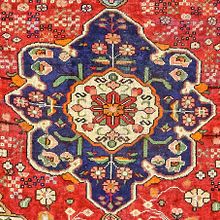Difference between revisions of "Mahabad Rug"
Jump to navigation
Jump to search
| Line 15: | Line 15: | ||
|Origin = {{flag|Iran}}: West Azerbaijan | |Origin = {{flag|Iran}}: West Azerbaijan | ||
| − | |Category = | + | |Category = City |
|Prime examples = | |Prime examples = | ||
|Master designers = | |Master designers = | ||
| Line 22: | Line 22: | ||
<!--Technical information--> | <!--Technical information--> | ||
| − | |Common designs = [[ | + | |Common designs = [[Geometric]] |
|Common motifs & patterns = | |Common motifs & patterns = | ||
|Common sizes = | |Common sizes = | ||
|Common colors = Red, Blue, Ivory, Begie | |Common colors = Red, Blue, Ivory, Begie | ||
| − | |Dyeing method = | + | |Dyeing method = Natural, Synthetic |
|Pile material = [[Wool]] | |Pile material = [[Wool]] | ||
|Foundation material = [[Cotton]] | |Foundation material = [[Cotton]] | ||
| Line 37: | Line 37: | ||
Mahabad rugs originate from Mahabad, formerly called Savojbolagh Mokri, in the province of Azerbaijan in northwestern Iran near Tabriz. Mahabad has been an important Kurdish center since the 19th century and served as the capital of a brief Kurdish Republic (consisting of the northern part of Persian Kurdistan, with Kurdish as the official language) from 1945-46. Mahabad weavers produce mainly a Turkoman area rug. The distinguishing feature of Mahabad rugs is the frequent use of an all-over pattern of small Turkish designs on very soft and luxurious pile. An area rug from Mahabad has a flat back and is woven with very rounded symmetrical knots. | Mahabad rugs originate from Mahabad, formerly called Savojbolagh Mokri, in the province of Azerbaijan in northwestern Iran near Tabriz. Mahabad has been an important Kurdish center since the 19th century and served as the capital of a brief Kurdish Republic (consisting of the northern part of Persian Kurdistan, with Kurdish as the official language) from 1945-46. Mahabad weavers produce mainly a Turkoman area rug. The distinguishing feature of Mahabad rugs is the frequent use of an all-over pattern of small Turkish designs on very soft and luxurious pile. An area rug from Mahabad has a flat back and is woven with very rounded symmetrical knots. | ||
<!-- from Rugman Archive: --> | <!-- from Rugman Archive: --> | ||
| + | ==History== | ||
| + | ==See also== | ||
| + | {{Wikipedia}}<br> | ||
| + | <br> | ||
| + | ==References== | ||
| + | {{Reflist}} | ||
| + | ==Bibliography== | ||
| + | # Abraham Levi Moheban. 2015. ''The Encyclopedia of Antique Carpets: Twenty-Five Centuries of Weaving''. NewYork: Princeton Architectural Press. | ||
[[Category:Persian Carpets]] | [[Category:Persian Carpets]] | ||
[[fa:قالی_مهاباد]] | [[fa:قالی_مهاباد]] | ||
Revision as of 11:30, 29 July 2020
| Mahabad Rug | |
|---|---|
 Design of Mahabad Rug (Rugman) | |
| General information | |
| Name | Mahabad Rug |
| Original name | قالی مهاباد |
| Alternative name(s) | Mahabad Carpet (Savojbolagh Rug) |
| Origin | |
| Category | City |
| Technical information | |
| Common designs | Geometric |
| Common colors | Red, Blue, Ivory, Begie |
| Dyeing method | Natural, Synthetic |
| Pile material | Wool |
| Foundation material | Cotton |
| Knot type | Symmetrical (Turkish) |
Mahabad rugs originate from Mahabad, formerly called Savojbolagh Mokri, in the province of Azerbaijan in northwestern Iran near Tabriz. Mahabad has been an important Kurdish center since the 19th century and served as the capital of a brief Kurdish Republic (consisting of the northern part of Persian Kurdistan, with Kurdish as the official language) from 1945-46. Mahabad weavers produce mainly a Turkoman area rug. The distinguishing feature of Mahabad rugs is the frequent use of an all-over pattern of small Turkish designs on very soft and luxurious pile. An area rug from Mahabad has a flat back and is woven with very rounded symmetrical knots.
History
See also
| Search for Mahabad Rug on Wikipedia. |
References
Bibliography
- Abraham Levi Moheban. 2015. The Encyclopedia of Antique Carpets: Twenty-Five Centuries of Weaving. NewYork: Princeton Architectural Press.